29 February
1468 – Birth of Alessandro Farnese at Canino, Latium, which was in the Papal States. Farnese was elected as pope in 1534, becoming Pope Paul III, and was pope until his death in 1549.
1528 - Burning of Patrick Hamilton, theologian and Scotland's first 'Protestant' martyr, took place on this day in 1528 outside St Salvator's College, St Andrews. It was an horrific death, with it taking around six hours for Hamilton to die. Alexander Alesius wrote of how Hamilton was roasted, rather than burned. Hamilton was condemned as a heretic after being found guilty of thirteen charges, seven of which were to do with doctrines from Philipp Melancthon's Loci communes rerum theologicarum seu hypotyposes theologicae.
1604 – Death of John Whitgift, Archbishop of Canterbury, at Lambeth Palace. He was the last Archbishop of Canterbury in Elizabeth I's reign, and had been in office since 1583.
1 March
1546 – Hanging and burning of George Wishart, Scottish evangelical preacher and martyr, at St Andrews, Scotland. In his preaching. Wishart had denounced the Pope and had continued preaching contrary to Cardinal Beaton's orders. He was tried on 1st March 1546, eighteen charges being levelled against him, and was condemned to death. He went to his death with courage, asking Christ's forgiveness for those who had condemned him to death “ignorantly”.
1553 – Edward VI opened Parliament. The King was ill at the time, so it was a much more low key ceremony than usual.
1554 – Birth of William Stafford, son of Sir William Stafford (husband of the late Mary Boleyn) and his second wife Dorothy Stafford. William is known as a conspirator, having concocted a plot, The Stafford Plot, probably on the instructions of William Cecil. This plot was supposedly against Elizabeth I, but its purpose is likely to have been to show Elizabeth that her life was in danger from Mary, Queen of Scots and her followers.
1559 – Death of Sir Thomas Tresham, Catholic politician and Grand Prior of England in the Order of Knights Hospitallers of St. John of Jerusalem, at Rushton in Northamptonshire. He was buried at St Peter's Church, Rushton. When Edward VI died in 1553, Tresham had supported Princess Mary's claim, and proclaimed her Queen in Northampton.
1562 – The Massacre of Vassy. Sixty-three Huguenot worshippers were killed, and over a hundred injured, when Francis, Duke of Guise, ordered his troops to set fire to the barn being used as a church in Vassy (Wassy), France. Trouble had started when some of his men had barged their way into the barn, and the Duke was hit by a stone being thrown.
1568 – Death of Sir Thomas Throckmorton, son of William Throckmorton. He was buried at Tortworth in Gloucestershire. In the reigns of Edward VI and Mary I, Throckmorton was a Justice of the Peace, and in Elizabeth I's reign he was a Sheriff, also serving on the Council in the Marches.
1587 – Death of Welsh landowner, lawyer and antiquary Rice Merrick at Cotrel. He was buried at St Nicholas' Church. Merrick was the author of Morganiae archaiographia (“A Book of Glamorganshire's Antiquities”).
1602 – Death of Herbert Westfaling, Bishop of Hereford, at Hereford. He was buried in the cathedral there.
1620 - Death and burial of physician, poet and musician Thomas Campion. He was laid to rest at St Dunstan-in-the-West, Fleet Street. His works included “Poemata, a collection of Latin panegyrics, elegies and epigrams” (1595), the 1601 songbook “A Booke of Ayres” and the 1602 “Observations in the Art of English Poesie”.
2 March
1535 – Death of Sir Robert Drury, lawyer, Privy Councillor and Speaker of the House of Commons.
1545 – Birth of Sir Thomas Bodley, scholar, diplomat and founder of the Bodleian Library, in Exeter. He was the son of John Bodley, a Protestant merchant who took his family into exile to Germany during Mary I's reign. The family returned to England in Elizabeth I's reign, and Bodley was able to study at Magdalen College, Oxford. He then lectured at Merton College before serving Elizabeth as a Gentleman Usher and then diplomat. He re-founded the Oxford University library in 1598, and it was re-opened in 1602 as Bodley's Library, or the Bodleian Library.
1618 – Burial of Elizabeth Carey, Lady Hunsdon, wife of Sir George Carey (Mary Boleyn's grandson). She was buried in the Hunsdon vault in Westminster Abbey.
1619 – Death of Anne of Denmark, consort of James VI and I, of dropsy and consumption. She was buried in Henry VII's Chapel in Westminster Abbey. According to her biographers Maureen M. Meikle and Helen Payne, her entrails were buried at the Abbey on 5th March and her body lay in state at Denmark House from 9th March to 13th May, when she was laid to rest at the Abbey. Her funeral was “in form and scale comparable to that of Queen Elizabeth.”
3 March
1500 - Traditional date given for birth of Cardinal Reginald Pole, Mary I's Archbishop of Canterbury, at Stourton Castle in Staffordshire. He was the third son of Sir Richard Pole and Margaret Pole (née Plantagenet), Countess of Salisbury. His mother was the daughter of George, Duke of Clarence, brother of Edward IV and Richard III.
1528 – Marriage of Margaret Tudor, sister of Henry VIII and widow of James IV, and her third husband, Henry Stuart (Stewart), 1st Lord Methven. She had divorced her second husband, Archibald Douglas, 6th Earl of Angus, in 1527. Margaret's marriage to Methven was not happy for long, though. Margaret had managed to pick another unfaithful husband, so she fought for a divorce, as she had with her second husband, but was not supported by her son, King James V. Margaret was later able to reconcile with Methven.
1542 – Death of Arthur Plantagenet, Lord Lisle, courtier, soldier, diplomat, administrator and illegitimate son of Edward IV. He had been arrested in May 1540 for alleged treasonable communications with Cardinal Pole, and, according to John Foxe, suffered a heart attack on 3rd March 1542 when told the news of his release from the Tower.
1551 - Death of Thomas Wentworth, 1st Baron Wentworth and Lord Chamberlain in the reign of Edward VI. He was a member of the jury at the trials of Anne Boleyn and George Boleyn, Lord Rochford, as well as those of Henry Pole, Baron Montagu, and Henry Courtenay, Marquis of Exeter. He was buried in the St John the Baptist Chapel, Westminster Abbey.
1551 - Burial of Martin Bucer, theologian and reformer, in Great St Mary's Church, Cambridge. He died 28th February.
1582 - Birth of Edward Herbert, 1st Baron Herbert of Cherbury, soldier, diplomat, philosopher, poet and author of "The Life and Raigne of King Henry the Eighth". Although his career was in the Stuart period, Tudor historians make use of his work on Henry VIII.
4 March
1522 - On the evening of Shrove Tuesday, Anne Boleyn played the part of Perseverance at the pageant of “The Château Vert”, her first recorded public appearance at court since her return from France.
1526 - Birth of Henry Carey, 1st Baron Hunsdon, courtier and administrator, was born. He was the only son of William Carey, courtier and favourite of Henry VIII, and his wife, Mary (née Boleyn). There is controversy over his paternity due to Mary Boleyn having a sexual relationship with Henry VIII at some point in the 1520s, but the majority of historians believe that Henry was fathered by Carey.
1584 – Death of Bernard Gilpin, reformer, theologian, Church of England clergyman and preacher. He was known as the "Apostle of the North" due to him carrying out preaching tours in Northern England. Some say he died in 1583.
1590 – Execution of Christopher Bales, Catholic Priest, in Fleet Street, London. He was found guilty of treason under the “Acts against Jesuits and Seminarists” (1585), 27 Elizabeth, Cap. 2.
1606 – Death of Sir Edward Fitton, member of Parliament and administrator, in London. He was buried in Gawsworth Church in Cheshire. Fitton served Elizabeth I as Receiver-General for Ireland, and was involved in the plantation of Ireland.
1607 – Death of George Coryate, clergyman and Latin poet, at Odcombe in Somerset. He was Rector there and died in his parsonage. He was buried in the chancel of his church. His son, Thomas, published some of George's work, Posthuma fragmenta poematum Georgii Coryati Sarisburiensis, in his own book, “Crudities”.
1609 - Death of William Bullokar at Chichester. Bullokar was a spelling reformer and grammarian. His works included the 1580 book "A Short Introduction or Guiding to Print, Write, and Reade Inglish Speech", "The Booke at Large", a translation of Aesop's Fables and the "Pamphlet for Grammar". He also reformed the alphabet.
5 March
1496 - King Henry VII of England issued letters patent to John Cabot (Giovanni Caboto), the Italian navigator and explorer, giving him
“...free authority, faculty and power to sail to all parts, regions and coasts of the eastern, western and northern sea, under our banners, flags and ensigns, with five ships or vessels of whatsoever burden and quality they may be, and with so many and with such mariners and men as they may wish to take with them in the said ships, at their own proper costs and charges, to find, discover and investigate whatsoever islands, countries, regions or provinces of heathens and infidels, in whatsoever part of the world placed, which before this time were unknown to all Christians.”
1549 – A bill of attainder was passed against Thomas Seymour, Baron Sudeley, after it was argued that his offences “were in the compasse of treason”. Seymour had been accused of attempting to kidnap his nephew, Edward VI, and also of plotting to marry the teenaged Elizabeth and put her on the throne.
1558 – Smoking tobacco was introduced in Europe by Francisco Fernandes.
1563 – Birth of Sir John Coke, politician and influential administrator during Charles I's reign.
1572 – Death of Edward Hastings, Baron Hastings of Loughborough, nobleman and soldier. In July 1553, when Lady Jane Grey became queen, he was involved in assembling supporters of Princess Mary in the Thames Valley and became one of Mary's trusted confidants. In the reign of Elizabeth I he was imprisoned in the Tower for hearing mass, but was released after taking the oath of supremacy.
1575 – Birth and baptism of William Oughtred, the mathematician responsible for developing a straight slide-rule, a gauging rod and various sundials. He also introduced the "×" symbol for multiplication and the abbreviations "sin" and "cos" for the sine and cosine functions.
1618 – Burial of Robert Abbot, Bishop of Salisbury, in Salisbury Cathedral.
6 March
1492 - Birth of Juan Luis Vives, scholar, humanist and tutor of Mary I, in Valencia, Spain.
1536 - Introduction into Parliament of the “Act for the Suppression (or Dissolution) of the Lesser Monasteries”. The act affected the “lesser monasteries”; those with fewer than twelve members and those worth less than £200 per year. They were to be dissolved, their heads pensioned off and their members to become secularized or moved to larger monasteries “where they may be compelled to live religiously for reformation of their lives”.
1547 - Thomas Wriothesley lost the Great Seal of his Lord Chancellorship and was confined to his home at Ely Place for abusing his authority. He was found guilty of issuing a commission without the knowledge or permission of the other executors of Henry VIII's will, but it was probably more to do with his opposition to Edward Seymour, Duke of Somerset, becoming Lord Protector. He was later re-admitted to the Privy Council, a position he'd also lost at his fall.
1597 - Death of William Brooke, 10th Baron Cobham, courtier and diplomat, from an ague. He died at Blackfriars and was buried at St Mary Magdalene Church, Cobham. Brooke was the son of George Brooke, 9th Baron Cobham, and his wife, Anne (née Bray), an attendant horsewoman at Anne Boleyn's coronation. In Elizabeth I's reign, Cobham served as Lord Warden of the Cinque Ports, Constable of Dover Castle, Lord Lieutenant and Vice Admiral of Kent, and Privy Councillor.



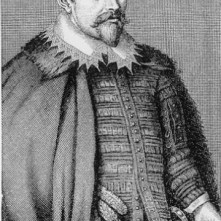

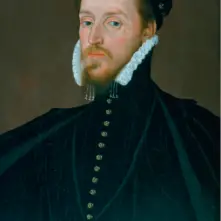
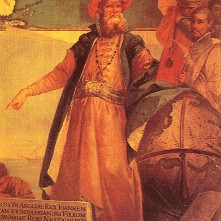
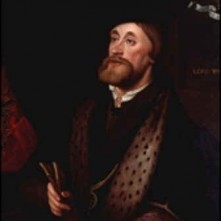
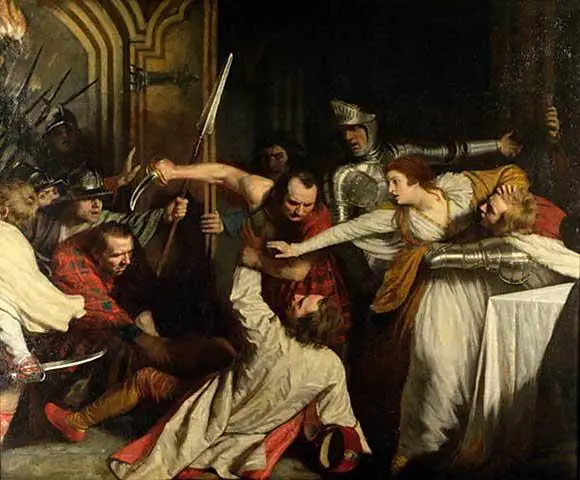
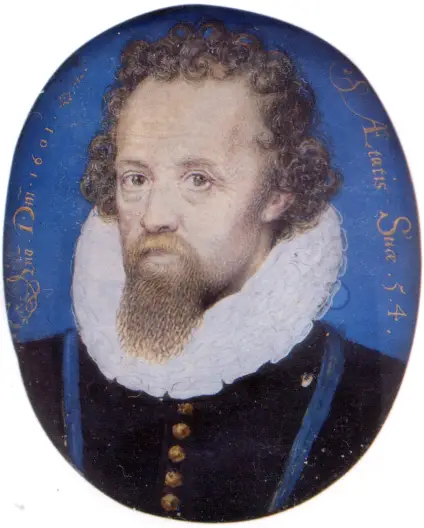
Leave a Reply